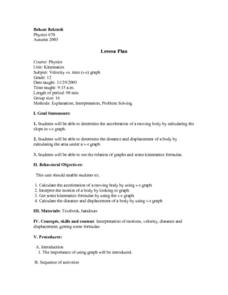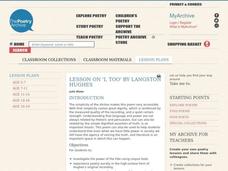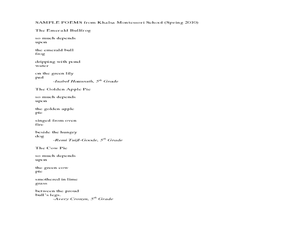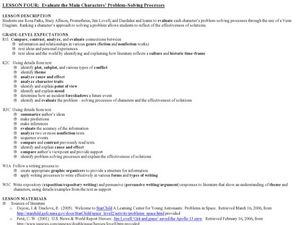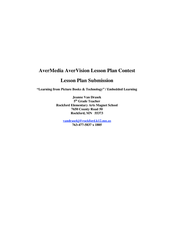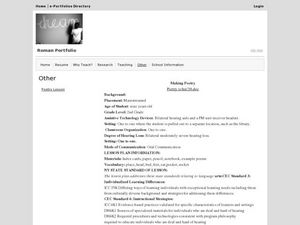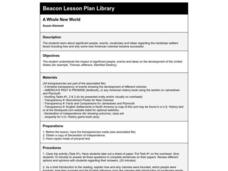Curated OER
1st Grade Math: Greater Than, Less Than
First graders participate in a variety of math activities that emphasize the concepts of greater than, less than, and equal to. They order numbers on the number line, compare numbers, create letters using numbers on a 1-100 number chart,...
Curated OER
Velocity vs. Time
Twelfth graders read and interpret v-t graphs. After studying velocity and time, 12th graders read graphs to calculate the acceleration of a moving body and determine the distance and displacement of a body. Students explore the...
Curated OER
Butterfly Life Cycle
Students identify the stages in the butterfly life cycle. After completing a KWL chart, students participate in a brief lecture on the stages of the butterfly life cycle. Using reading books and Internet research, students complete an...
Curated OER
Voices of Tragedy and Horror: Remembering the Holocaust
Students consider the implications of the Holocaust. In this World War II lesson, students read the graphic novel Maus at the end of a unit on World War II. Students discuss the impact of reading about the Holocaust as well as theme of...
Curated OER
X or Y- Does it Make a Difference?
Students examine the X and Y chromosomes. In this research lesson, students use the 5E lesson model as they read articles about human chromosomes then discuss their findings and opinions.
Curated OER
Beginning and Ending Sounds
First graders practice their letter and word recognition skills. In this initial and final sounds lesson, 1st graders participate in a classroom activity that requires them to blend phonemes into spoken words and sound out multisyllable...
Curated OER
The Poetry Archive
Students investigate the power of title and poetry in a Langston Hughes' poem. In this poetry analysis lesson, students discuss the poem 'I, Too' for its title and content. Students use the variation in English Words and Phrases website...
Curated OER
Painting Presidential Portraits
Eleventh graders examine the duties and powers of the president. In this American Government lesson, 11th graders research to find information on the role of the president. Students practice reading and listening skills.
Curated OER
The Red Wheelbarrow
Learners explore an imagist poem. In this poetry lesson students write a poem in the imagist's style using "The Red Wheelbarrow" by William Carlos Williams as an example. The poems are read aloud and discussed.
Curated OER
Evaluate the Main Characters? Problem-Solving Processes
High schoolers read passages from several sources and evaluate the text for various criteria. In this problem solving lesson, students evaluate character problem solving processes after reading passages. They will use a Venn Diagram to...
Curated OER
Learning From Picture Books and Technology
Fifth graders complete a demonstration on how to set up, use, and close down a camera. In this technology lesson plan, 5th graders complete the correct sequence and answer questions about camera usage.
Curated OER
Making Poetry
A hearing impaired student identifies rhyming words. In this rhyming word lesson for the hearing impaired, 2nd graders read and write poetry correctly using rhyming words.
Curated OER
Cesar Chavez
In this Cesar Chavez worksheet, students read about the life of Cesar Chavez, then complete a variety of comprehension activities: a synonym match, phrase match, fill-in-the-blanks, spelling and sequencing. Homework suggestions are given.
Pennsylvania Department of Education
6 Traits: Word Choice
Students explore language arts by participating in a vocabulary usage activity. In this word choice lesson, students read examples of great word usage in literature and discuss with the class why some words appear stronger than others....
Curated OER
Tiki, Tiki Rainforest
Young scholars explore fascinating world of rainforest, and participate in activities such as adopt-an-acre-of-the- rainforest, adopt-a-rainforest-animal, sequencing, comparing and contrasting, word processing and searching the Internet.
Curated OER
A Whole New World
Learners examine a timeline of a sequence of events displaying how the colonies were founded. They analyze Jamestown and Plymouth recruitment posters, write journal entries, and play a Jeopardy game with questions about the colonies.



